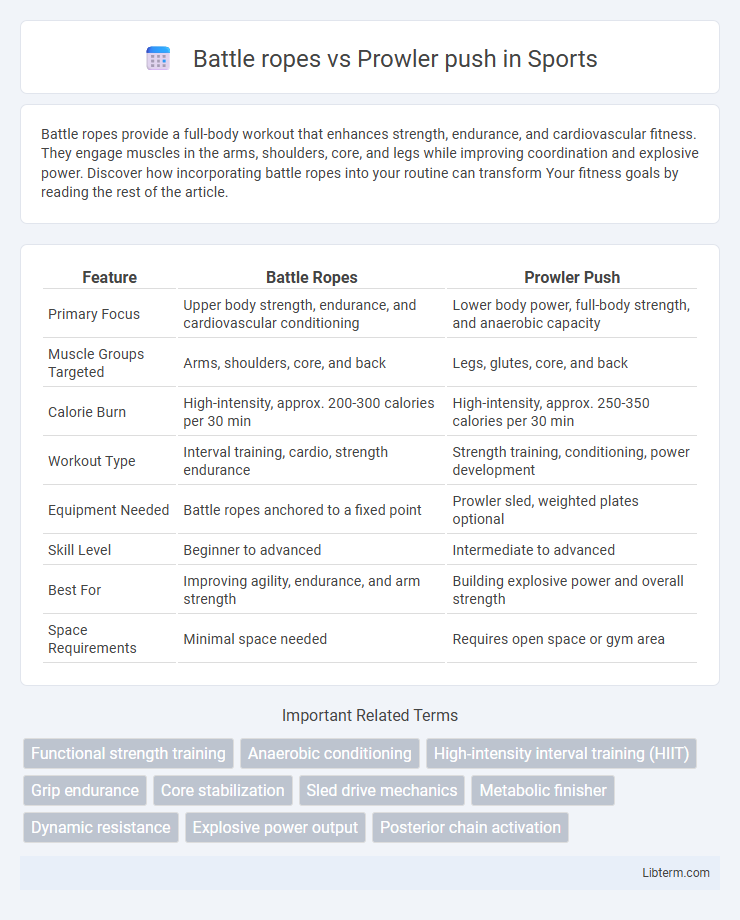Battle ropes provide a full-body workout that enhances strength, endurance, and cardiovascular fitness. They engage muscles in the arms, shoulders, core, and legs while improving coordination and explosive power. Discover how incorporating battle ropes into your routine can transform Your fitness goals by reading the rest of the article.
Table of Comparison
| Feature | Battle Ropes | Prowler Push |
|---|---|---|
| Primary Focus | Upper body strength, endurance, and cardiovascular conditioning | Lower body power, full-body strength, and anaerobic capacity |
| Muscle Groups Targeted | Arms, shoulders, core, and back | Legs, glutes, core, and back |
| Calorie Burn | High-intensity, approx. 200-300 calories per 30 min | High-intensity, approx. 250-350 calories per 30 min |
| Workout Type | Interval training, cardio, strength endurance | Strength training, conditioning, power development |
| Equipment Needed | Battle ropes anchored to a fixed point | Prowler sled, weighted plates optional |
| Skill Level | Beginner to advanced | Intermediate to advanced |
| Best For | Improving agility, endurance, and arm strength | Building explosive power and overall strength |
| Space Requirements | Minimal space needed | Requires open space or gym area |
Introduction to Battle Ropes and Prowler Push
Battle ropes engage multiple muscle groups through dynamic, high-intensity waves and slams, enhancing cardiovascular endurance and upper body strength. The prowler push targets lower body power and total body conditioning by driving a weighted sled across a surface, emphasizing leg strength and explosive movement. Both exercises improve functional fitness but focus on different muscle activation and training effects.
Key Benefits of Battle Ropes
Battle ropes enhance cardiovascular endurance and muscular strength by engaging multiple muscle groups through dynamic, high-intensity movements. They improve coordination, grip strength, and core stability while providing a low-impact, full-body workout suitable for all fitness levels. Unlike the prowler push, battle ropes offer versatile training options that target explosive power and endurance without requiring heavy equipment or large space.
Key Benefits of the Prowler Push
The Prowler push excels in building explosive lower body power, enhancing cardiovascular endurance, and improving overall functional strength through heavy resistance training. It simultaneously targets the glutes, quads, hamstrings, and core muscles, promoting full-body muscle coordination and increased calorie burn. This sled-based workout offers scalable intensity, making it ideal for athletes and fitness enthusiasts aiming to boost speed, strength, and muscular endurance.
Muscle Groups Targeted
Battle ropes primarily engage the upper body muscles, including the shoulders, arms, and core, with secondary activation of the legs for stabilization. Prowler push focuses on lower body muscles such as the quadriceps, hamstrings, glutes, and calves, while also demanding significant core and upper body strength for propulsion and control. Both exercises complement each other by targeting different muscle groups, enhancing overall functional strength and endurance.
Cardiovascular Impact
Battle ropes significantly elevate heart rate through continuous, high-intensity arm swings and wave patterns, promoting endurance and cardiovascular conditioning. Prowler pushes engage large muscle groups like the glutes, quads, and hamstrings, resulting in increased oxygen consumption and improved cardiovascular efficiency during short bursts of maximal effort. Both exercises contribute to cardiovascular health but differ in muscle engagement and intensity patterns, with battle ropes favoring rhythmic endurance and prowler pushes targeting explosive power with heart rate spikes.
Strength and Power Development
Battle ropes enhance upper body strength and power through rapid, high-intensity waves that engage the shoulders, arms, and core, promoting explosive muscular endurance and grip strength. Prowler push targets lower body strength and power by requiring maximal force production from the quads, glutes, and hamstrings during forward sled pushes, emphasizing anaerobic power and overall athletic conditioning. Both exercises complement strength and power development by activating different muscle groups and energy systems essential for functional athletic performance.
Space and Equipment Requirements
Battle ropes require minimal floor space and only a secure anchor point, making them ideal for compact home gyms or limited workout areas. Prowler push demands a larger, clear area with smooth flooring to accommodate the sled's movement and prevent damage. Equipment-wise, battle ropes are cost-effective and portable, while Prowlers involve higher investment and bulkier storage needs.
Versatility in Workout Routines
Battle ropes offer dynamic upper body and core engagement with varied wave patterns, making them ideal for high-intensity interval training, cardio, and strength endurance. Prowler push emphasizes lower body power, explosive strength, and overall conditioning by simulating sprinting motion under resistance, primarily targeting quads, glutes, and calves. Combining both tools enhances workout versatility by addressing complementary muscle groups and energy systems, optimizing functional fitness and performance gains.
Injury Risk and Safety Considerations
Battle ropes offer a low-impact workout that reduces joint strain and minimizes injury risk by focusing on controlled, rhythmic movements ideal for upper body conditioning. Prowler push exercises involve high-intensity, full-body exertion with increased risk of musculoskeletal injuries due to heavy loads and improper form, especially affecting the lower back, knees, and shoulders. Prioritizing proper technique, using appropriate weight, and incorporating adequate warm-up routines can significantly enhance safety during both battle ropes and prowler push workouts.
Choosing the Right Exercise for Your Goals
Battle ropes excel in improving cardiovascular endurance and upper body power, making them ideal for those targeting fat loss and muscle toning. The prowler push enhances overall strength, particularly in the legs and core, and is highly effective for athletes aiming to increase explosive power and functional strength. Selecting between these exercises depends on your primary objectives: opt for battle ropes for metabolic conditioning and muscular endurance, or choose prowler pushes to develop maximal strength and explosive athletic performance.
Battle ropes Infographic

 libterm.com
libterm.com